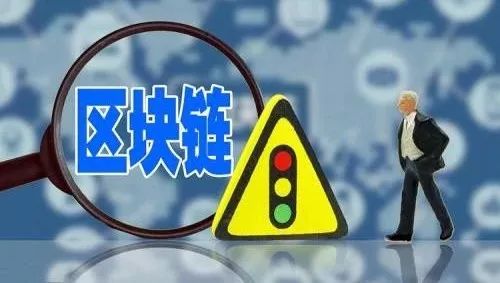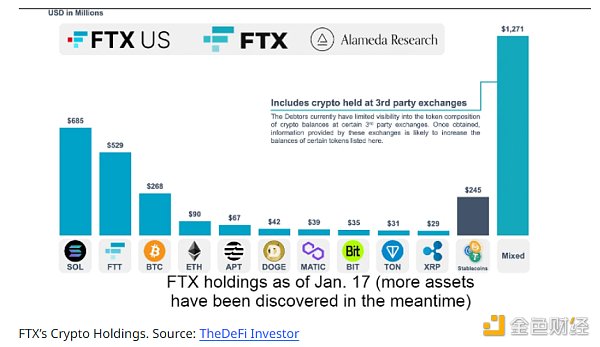Embracing the blockchain revolutionary sentiment, but there are still many risks and challenges in terms of law and security.
Blockchain is a revolutionary concept that has a direct impact on different industries. However, blockchain is not without risk, and these risks come from applications, investments, legal, operational, security, financial, and other aspects. We will take stock of these risks in this article and look at the blockchain from another perspective.
When we talk about blockchain, we refer specifically to the technology itself, not to the cryptocurrency using blockchain technology. So, what are the risks of the blockchain?
01 Overall blockchain risk
The overall blockchain risk that may affect all blockchain projects is as follows:
1. Blockchain protocol is difficult to integrate
Blockchain is a new technology, which means that it is difficult to integrate multiple blockchain protocols within a single project. Consulting firm Deloitte believes that it is difficult to adopt different blockchain protocols in a project.
- Bitcoin mining or welcoming 3.0 era, Stratum V2 will return power to miners
- The ban on anonymous accounts is the first step, and the Korea Financial Services Commission wants to directly regulate cryptocurrency exchanges.
- Bitcoin lending services really make money? BlockFi won a $18.30 million Series A financing from a number of well-known institutions
For example, when people try to share information from the Hyperledger Fabric protocol to the Ethereum protocol, an integration layer will be needed to manage the two different enterprise-level blockchain platforms.
2. Lack of standardization
Different blockchain frameworks mean a lack of standardization, which is likely to be the biggest risk facing blockchain projects today.
These standards include standards applicable to the entire blockchain ecosystem, including 1CO, cryptocurrencies, and frameworks. 1CO is the most risky in this regard, and because of the lack of standardization, investors cannot get proper protection, which makes 1CO a gamble.
3. Bad valuation of cryptocurrency
Due to the use of blockchain technology, the price of cryptocurrency has become one of the biggest concerns. A reasonable cryptocurrency price will also change the market sentiment towards the blockchain.
The price of bitcoin using blockchain technology is sometimes much higher than investors' expectations, which means that prices can fall sharply and investors lose a lot. Obviously, prices are unstable, which is a risk for traders who support a blockchain project or a cryptocurrency.
02 Blockchain development risk

After a general understanding of the overall risks of the blockchain, the next step is to explore the development risks of the blockchain.
Nowadays, most industries have applied blockchain technology, such as the medical industry, supply chain , and even government public services. Many people want to make full use of this breakthrough technology. The following are the development risks of the blockchain:
1. Underdeveloped standards
There is a necessary standardization behind each technology. This means that companies around the world can use this technology to spread the technology around the world. So far, due to the rapid development, there is no proper standard for blockchain.
Different organizations are embarking on the development of "own" versions of blockchain or distributed ledger technology. In addition, the competition in the blockchain field is fierce, which makes it more difficult for different organizations to collaborate on the main objectives. There are risks in terms of security, privacy and operability due to the lack of fully developed standards.
2. High power demand
It can be said that the workload proves to be the most popular consensus mechanism, and Ethereum and Bitcoin use this consensus. Ethereum is the most popular when it comes to blockchain applications. Each kind of consensus has its own strengths and weaknesses, and the proof of work is an effective way to reach a consensus, because it gives incentives to the work done by the miners, but the electricity bill is a high disadvantage.
Under the workload proof consensus mechanism, each node competes with each other by solving a highly complex mathematical problem. To solve this mathematical problem, miners have to invest in high-performance machines that require a lot of power to run. Blockchain developers are gradually recognizing this impact, and they are slowly turning to a more energy-friendly consensus approach, such as proof of equity.
3. Data Privacy Act
Data privacy is one of the most important issues related to blockchain or distributed ledger technology. Clearly, distributed ledger technology is designed to increase data privacy, which will have a large impact on current social infrastructure. Data privacy laws are being implemented in different countries and regions, such as the EU's Universal Data Protection Act, which is also critical for blockchains.
One of the most prominent features of the blockchain is anonymity, but because of the requirements of knowing your customers ( KYC ) and anti-money laundering (AML), blockchain does not always protect anonymity.
4. Trust in blockchain managers and developers
One of the most prominent concepts of the blockchain is that there is no need for trust. However, because it is a new technology, the influx of many participants makes the blockchain ecosystem more complex, which means that customers or end users may find it difficult to trust these new blockchain platforms.
It is important to implement the implementation and the developers and managers will be responsible for these blockchain projects. This also means that they will make major decisions, including which type of encryption algorithm, soft fork or hard fork. These decisions may be biased and pose a risk to the core concept of the blockchain itself.
5. User's role
Users are the core of decentralization. Without a centralized authority, users will have to take responsibility for handling their own accounts. This means that they have to take care of the private key , and the user needs a private key to access the wallet and the information stored on the blockchain. If the private key is lost, the user will not be able to access the data. In addition, the blockchain cannot be restored or retrieved, which poses user-related risks.
6. Trading speed
One of the most widely used to claim the advantages of the blockchain is the time it takes to clear transactions. However, for every transaction, time is not always as fast as propaganda. If we take Bitcoin as an example, the time to complete a transaction can range from ten minutes to several hours.
Scalability is also a big issue. Whenever there is a blockage, the transaction speed will be further reduced. For users who use blockchain solutions, he may not know the state of the network. If the transaction is urgent, he may be adversely affected. The solution to this problem is the private network, but it also has its own disadvantages.
7. Malicious users
All systems or solutions have malicious users, and the blockchain is no exception. A malicious user affects the blockchain network by controlling a portion of the blockchain. These risks are real and developers should take steps to ensure that malicious people have no control over network resources or consensus algorithms under any circumstances.
03 Legal risk of blockchain

Blockchain also has some legal risks. In order to protect users and ensure that blockchain technology is properly applied, the government has enacted and enforced some laws. The government also wants to control new technologies.
However, most of the time, the government proposed those laws to protect the interests of users, service providers and the government. If you are developing a product related to a blockchain or want to use a blockchain product, then you should be aware of the legal risks of the blockchain.
1. Data privacy
When it comes to distributed account technology, the biggest concern is data privacy. Distributed account technology means that all information stored in the blockchain remains on the blockchain, even if it is personal information. When we say that it is distributed, it means that the data may be stored in many different locations, which means that it is easily subject to multiple jurisdictions, making data privacy a very complex issue.
For beginners, data privacy laws should be followed by data, and we can comply with the EU-US Privacy Protection Act, but this may only apply to transactions between the EU and the US. Even though it is effective for these areas, it does not cover the rest of the world. The EU's General Data Protection Act is only for EU citizens. Another thing that complicates data privacy is that blockchain data is immutable. Once the data is stored on the blockchain, the user cannot remove the data under any circumstances.
2. Jurisdiction and dispute resolution
Jurisdiction and dispute resolution are another important concern.
Modern blockchain platforms such as Ethereum can solve this problem with smart contracts, which can include codes that apply to a specific jurisdiction, but the challenge is how to enforce this jurisdiction.
In addition, there are questions about who will resolve the dispute if needed. The dispute resolution process is also a big challenge that needs to be addressed. Finally, it is also necessary to decide to reward the party that resolves the dispute. In general, considering the nature of distributed ledger technology, it is difficult to solve these problems.
3. Compliance risk
The final legal risk of the blockchain is compliance risk. Governments have adopted rules on distributed ledger technology. In some cases, the federal government will authorize state governments to make their own rules, which will further complicate matters. With the rise of digital currencies, the federal government's laws to protect the interests of users and maintain economic balance are common.
04 Blockchain security risks

Although distributed ledger technology is known for its excellent security, it does not mean that they are completely secure. They may still be attacked and data or information may still be stolen. You should be aware that blockchains are not 100% safe and precautions should be taken to ensure security. The following are the security risks of the blockchain:
1. Risk associated with personnel
Although the blockchain is completely decentralized, it still has to interact with people, and the staff must take the right actions. For example, any business organization needs to interact with a blockchain system through a computer or automated system. When a worker operates a computer, there is a possibility that a person's access to the system's credentials is stolen or destroyed. This makes the blockchain vulnerable because it happens on the terminal.
In fact, this is only a user-related risk, but since the blockchain is to interact with the user, it should be defined as a blockchain risk.
2. The risk of public and private keys
Blockchain or distributed ledger technology relies heavily on public and private keys . If you don't have the correct public key private key combination, you won't be able to access the digital content stored on the blockchain.
Hackers know that guessing public or private keys is a waste of time, so they choose the vulnerability of "attacking the system used by users" to obtain the key. The system used by the user may be a mobile phone or a personal computer. Hackers may exploit the weaknesses of these devices to obtain public and private keys.
If you are an Android user, hackers can get the information you share by installing malware, and they can access the information stored in the blockchain after getting the private key.
In most cases, the private key is stolen because the user has not taken security measures. Hackers may also gain access to a computer or system through hardware weaknesses. As a user, your task is to make sure your system is as secure as possible. You can upgrade your device regularly, use very good anti-virus software and firewalls, don't store keys in Word text or other types of files, don't post or store keys via email.
3. Risk of blockchain technology vendors
With the development of distributed ledger technology, we will see third-party research and development areas such as wallets, payment processors, smart contracts and blockchain payment platforms.
These vendors may also pose risks to users. If you have weaknesses in the platform or service you use, you will encounter security issues when accessing these platforms or services.
Security issues can come from bad code, fragile security measures, or people's wrong actions. Since most vendors use smart contracts, they want to make sure that smart contracts don't have any security holes or flaws. If there are security holes or defects, it can easily spread to the entire system.
4. Code quality and no large-scale testing
For most blockchain solutions, code quality is a big concern. Decentralized organizations need to be extra careful when deploying solutions. An example is the shocking THE DAO hacking incident worldwide. In this incident, hackers used their system vulnerabilities to obtain a large amount of digital currency from digital money investment funds.
In addition, distributed ledger technology runs only on small-scale networks before going live. Developers need to use test networks to simulate networks. They can do multiple tests, but tests do not include problems that may occur on large-scale networks. .
No. 296: Which risk do you most worry about in the blockchain? why? Feel free to share your opinion in the message area.
Compilation: Wayne vernacular blockchain
Source: vernacular blockchain
『Declaration : This article was translated from "101 Blockchains" by Nitish Singh, and the translator has deleted it. The article is an independent view of the original author, does not represent the vernacular blockchain position, and does not constitute any investment advice or suggestion. It is not authorized by any third party to reproduce this article without the authorization of the “white-speaking blockchain”. 』
We will continue to update Blocking; if you have any questions or suggestions, please contact us!
Was this article helpful?
93 out of 132 found this helpful
Related articles
- Thinking about Libra | Zhou Xiaochuan: Calling for some kind of global central bank role "online"
- Analysis | Ethereum's expansion problems and solutions
- Why does Walmart need a "Walmart Coin" cryptocurrency?
- Comment: Bitcoin market leading rate will reach 80%, the era of altcoin and hard fork coins has ended
- The first anniversary of Shenzhen blockchain electronic invoices: nearly 6 million invoices, amounting to 3.9 billion yuan
- Analysis of the trend of gold and bitcoin in the first half of 2019 – Who is the king of risk?
- Samsung's blockchain ambition: from bystanders to layout people (with Samsung blockchain events)






